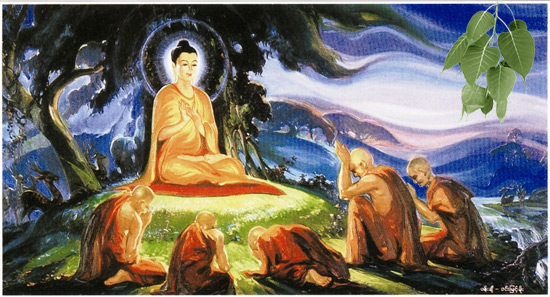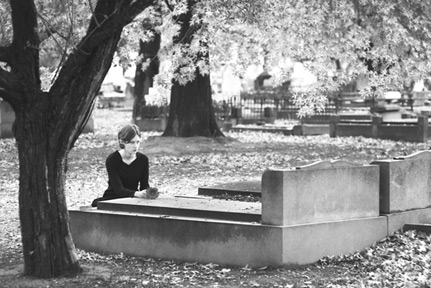|
Esala Poya on Saturday :
Life doesn’t begin with birth, nor end with death
By Lionel Wijesiri
Experiencing the death of a loved one, or witnessing the death of
another, can be one of the most profound events in one’s life. But death
can be a teacher. Only in facing death, those of loved ones and our own,
can we be free from the fear of it and learn the lessons it has to teach
about life.
Life is impermanent. Everyone knows it. After we come into this
world, we may live for 60 years, or possibly a 100 years, or perhaps
even longer. But we grow, and finally we have to die. According to
Buddhism, our life does not begin only at the moment of birth; and death
too, does not imply the end of everything.
|

The Buddha delivered His first sermon to the five ascetics,
Kondanna, Vappa, Bhaddiya, Mahanama and Assaji at the Deer
Park at Varanasi, on the Esala Full Moon Poya Day. |
Actually, we existed before we were born, and we will have another
life after death. We will be reborn in another place and the cycle of
life and death will continue endlessly. The constant rebirth into this
suffering world is a bigger problem than the simple death at the end of
each life. Constant rebirth is difficult to solve and it becomes a
critical issue when we recognise and wish to overcome it.
Personal experience
I lost my mother exactly 25 years ago. She was 76 years old when she
died and no one realised how ill she was. I don’t think she even knew.
In fact, she had been to the doctor just three days before and the
doctor had diagnosed her as having a simple lung infection, and sent her
home with some antibiotics.
She died a few days later peacefully. She did not die alone and I,
along with the rest of the family, had an opportunity to be around her
when she closed her eyes forever. We were lucky because not many people
will get this opportunity.
On the day she was cremated, a friend gave me a copy of the
Dhammapada. He has marked few pages and he wanted me to go through them
carefully. Those verses addressed effectively, but in simple terms, the
Buddhist concept of death.
In Section 20 of the Dhammapada, Maggavagga : (The Path), there are
four verses that seemed to speak of death:
286. Here shall I live during the rains, here in winter and summer” -
thus thinks the fool. He does not realise the danger (that death might
intervene).
287. As a great flood carries away a sleeping village, so death
seizes and carries away the man with a clinging mind, doting on his
children and cattle.
288. For him who is assailed by death there is no protection by
kinsmen. None there are to save him - no sons, nor father, nor
relatives.
289. Realising this fact, let the wise man, restrained by morality,
hasten to clear the path leading to Nibbana.
These verses clearly call attention to our powerlessness when it
comes to death. It sweeps through our lives, often without warning, and
nothing can prevent it. They also point out how most people hide their
heads in the sand, pretending death will never affect them, that this
life will go on forever.
This idea is confirmed and expanded in Section 18: Malavagga:
Impurity
237. Your life has come to an end now; you are setting forth into the
presence of Yama, the king of death. No resting place is there for you
on the way, yet you have made no provision for the journey!
238. Make an island unto yourself! Strive hard and become wise! Rid
of impurities and cleansed of stain, you shall not come again to birth
and decay
True nature
The Buddha has a fine understanding of our existence. It is the
understanding that birth and death are notions. They are not real. The
fact that we think they are true makes a powerful illusion that causes
all our suffering.
The Buddha taught that if there is no birth, there is no death; if
there is no coming, there is no going; if there is no permanent self,
there is no annihilation. We only think there is. When we understand
that we cannot be destroyed, we are liberated from fear. It is a great
relief. We can enjoy life and appreciate it in a new way.
The same thing happens when we lose any of our beloved ones. The day
my mother died I wrote in my journal, a serious misfortune of my life
has arrived.
|

Losing someone you love or care deeply about is a painful
experience which might last for a long time |
I suffered for more than one year after the passing away of my
mother. But one night, while I was sleeping alone in the house, I
dreamed of my mother. I saw myself sitting with her and we were having a
nice chat. She looked young and beautiful, her hair flowing down. It was
so pleasant to sit there and talk to her as if she had never died.
When I woke up, I felt very strong as if I had a sudden realisation.
I understood that there is no life without death, and the accompanying
grief is natural to the experience of death in all its forms. Finding
the courage to accept loss and death, and to enter into the grief they
bring, is a sacred act that allows us to participate in the deeper truth
that, although evil and death are real, they are not ultimate.
The Buddha says life is suffering, caused by desire. To end the
suffering, we must end desire. From a greater perspective, death causes
pain because of our desire for life. We fear death because we hold on-to
life.
Here, the folly of attachment is brought into the sharpest relief,
because we know the body is as sure to die as it was born. Death is all
around us. We will die and all the people we love will die. Understood
this way, the only sensible course of action seems to be to seek that
state where death cannot follow Nirvana, the state of being awake. This
is how Buddhism addresses the issue of death, and it has an intuitive,
practical logic to it.
Next life
You should face death, looking at it as an old friend who always is
there to help you find a new body. If you have thoroughly trained your
mind then you will face death with confidence. Any other context can
lead to a death filled with pain, uncertainty, and anguish.
The road to the next life is one you have to travel alone. Even if
you have 50 relatives and a 1,000 friends at your deathbed giving you
comfort, they will be of no consequence at all when you die.
You have to go alone. It is only the person, whether religious or
not, who accepts and embraces death in its right perspective that can
live a truly spiritual life. |

